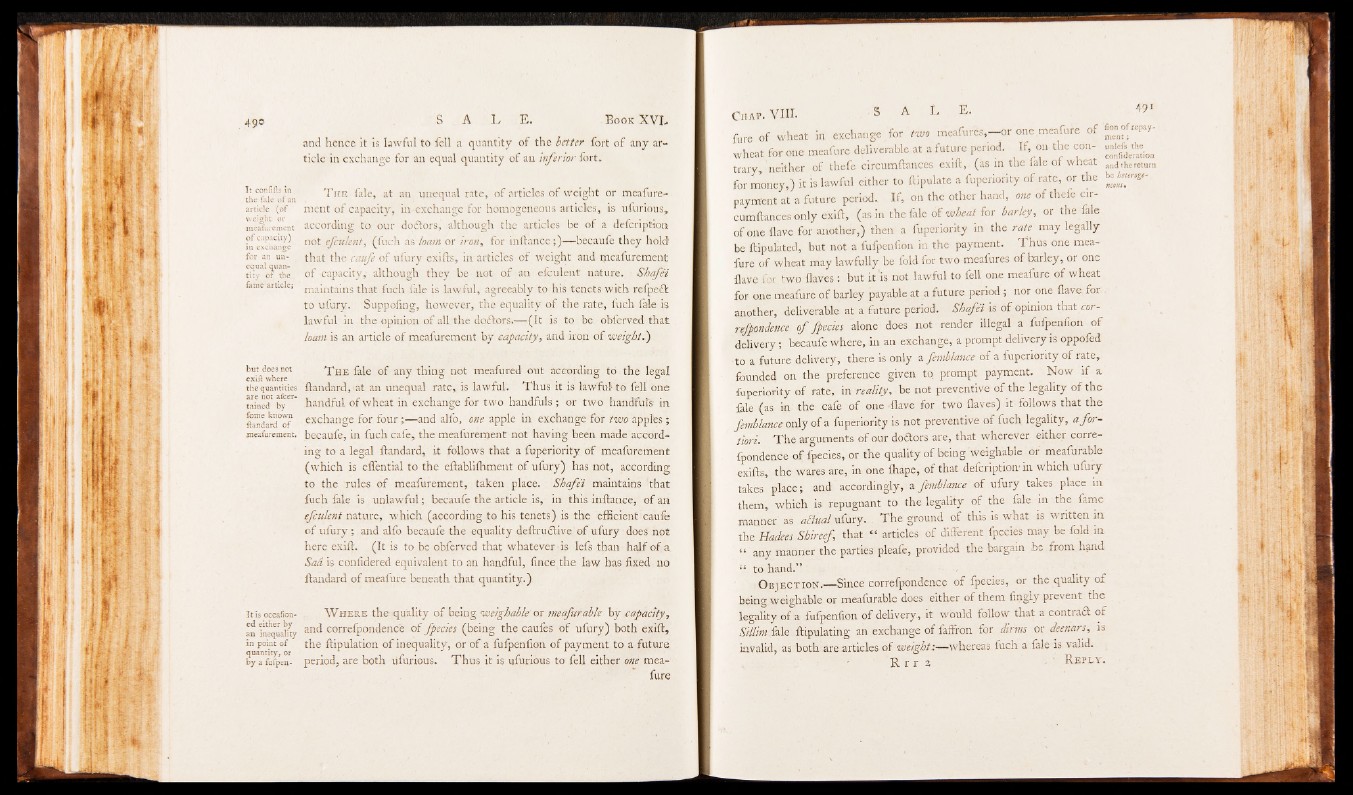
and hence it is lawful to fell a quantity of the better fort of any article
in exchange for an equal quantity of an inferior fort.
It confifts in
the laie o f an
article (of
weight or
meafurement
o f capacity)
for an unequal
quantity
o f the
fame article;
but does not
exift where
the quantities
are not afcer-
tained by
fome known
ftandard o f
meafurement.
It is occafion-
ed either by
an inequality
in point o f
quantity, or
by a fufpen-
T he fale, at an unequal rate, of articles of weight or meafurement
of capacity, in exchange for homogeneous articles, is ufurious,
according to our dodtors, although the articles be of a defcription
not efculent, (fuch as loam or iron, for inftance;)— becaufe they hold'
that the caufe of ufury exifts, in articles of weight and ipeafurement
of capacity,- although they be not of an efculent nature. Shafei
maintains that fuch fale is lawful, agreeably to his tenets'with refpedb
to ufury. Suppofing, however, the equality of the rate, fuch fale is
lawful in the opinion of all the doftors.— (It is to be obferved that
loam is an article of meafurement by capacity, and iron of weight.')
T he lale of any thing not meafured out according to the legal
ftandard,*at an unequal rate, is lawful. Thus it is lawful to fell one
handful of wheat in exchange for two handfuls; or two handfuls' in
exchange for four;— and alfo, one apple in exchange for two apples;
becaufe, in fuch cafe, the meafurement not having been made according
to a legal ftandard, it follows that a fuperiority of meafurement
(which is effential to the eftablifhment of ufury) has not, according
to the rules of meafurement, taken place. Shafei maintains 'that
fuch fale is unlawful; becaufe the article is, in this inftance, of an
efculent nature, which (according to his tenets) is the efficient caufe
of ufury; and alfo becaufe the equality deftrudtiveof ufury does not
here exift. (It is to be obferved that whatever is lefs than half of a
Sad is confidered equivalent to an handful, fince the law has fixed no
ftandard of meafure beneath that quantity.)
W here the- quality of being weighable or meafurable by capacity,
and correfpondence of fpecies (being the caufes of ufury) both exift,
the ftipulation of inequality, or of a fufpenfion of payment to a future
period, are both ufurious. Thus it is ufurious to fell either one meafure
fure of wheat in exchange for two meafures, or one meafure of
wheat for one meafure deliverable at a future period. If, on the contrary,
neither of thefe circumftances exift, (as in the fale of wheat
for money,) it is lawful either to ftipulate a fuperiority of rate, or the
payment at a future period.. If, on the other hand, one of thefe circumftances
only exift, (as in the fale of wheat for barley, or the fale
of one Have for another,) then a fuperiority in the rate may legally
be ftipulated, but not a fufpenfion in the payment. Thus one meafure
of wheat may lawfully be fold for two meafures of barley, or one
Have for two Haves : but it'is not lawful to fell one meafure of wheat
for one meafure of barley payable at a future period; nor one Have for
another, deliverable at a future period. Shafei is of opinion that correfpondence
fion o f repayment
o f fpecips alone does not render illegal a fufpenfion of
delivery; becaufe where, in an exchange, a prompt delivery is oppofed
to a future delivery, there is only a femblance of a fuperiority of rate,
founded on the preference given to prompt payment. Now if a
fuperiority of rate, in reality, be not preventive of the legality of the
fale (as in the cafe of one -Have for two Haves) it follows that the
femblance only of a fuperiority is not preventive of fuch legality, a fo r tiori.
The arguments of our dodtors are, that wherever either correfpondence
of fpecies, or the quality of being weighable of meafurable
exifts, the wares are, in one ftiape, of that defcription1 in which ufury
takes place; and accordingly, a femblance of ufury takes place in
them, which is repugnant to the legality of the fale in the fame
manner as aBual ufury. . The ground of this is what is written in
the Hadees Shireef, that “ articles, of different fpecies may be fold in
“ any manner the parties pleafe, provided the bargain be from hand
“ to hand.” ■ ,
O b j e c t io n .— Since correfpondence of fpecies, or the quality of
being weighable or meafurable does either of them fingly prevent the
legality of a fufpenfion of delivery, it would follow that a contradt of
Sillim.fale ftipulating an exchange of faffron for dirms or deenars, is
invalid, as both are articles of weight:.— whereas fuch a fale is valid.
R r r 2 • ' R eply.
;
unlefs the
confideration
and the return
be keteroge- ,
neous•